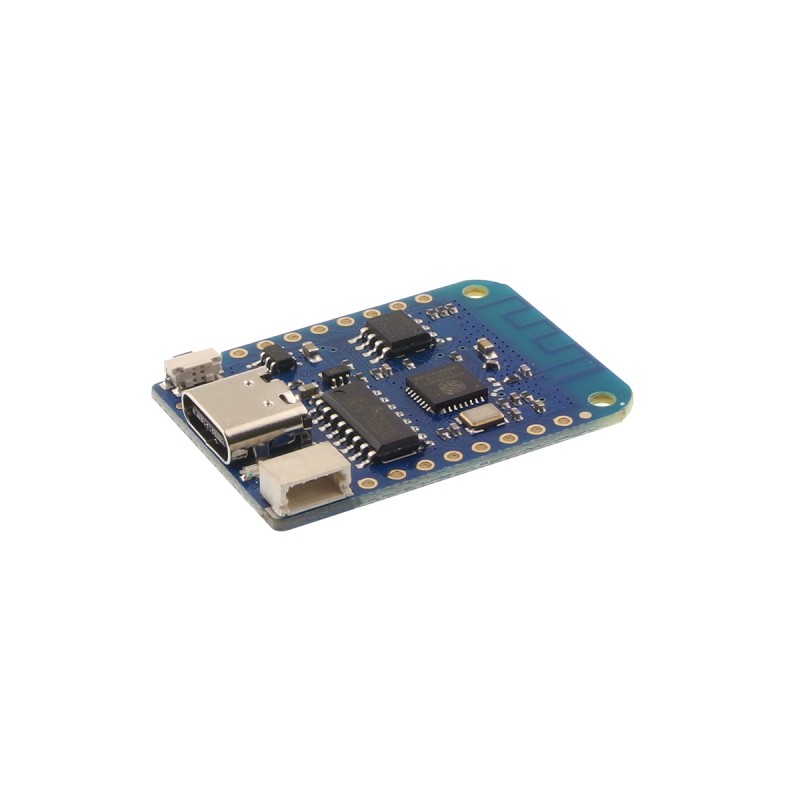






zł11.56 tax excl.
The module is based on the ESP8266EX chip. Thanks to the support of the 802.11 b/g/n standard, it enables wireless communication with WiFi networks, which allows for Internet access and data exchange. It is programmed via the USB Type-C connector using Arduino, MicroPython or NodeMCU. WeMos D1 Mini Type-C
Wemos D1 Mini is a module based on the ESP8266EX chip. Thanks to the support of the 802.11 b/g/n standard, it enables wireless communication with WiFi networks, which allows for Internet access and data exchange. In addition, support for Wi-Fi Direct (P2P) and Soft AP enables direct communication between devices and the creation of an access point. The ESP8266EX is equipped with a low-power 32-bit processor that can be used as an application processor. It also has 4 MB Flash memory.
The interface includes 11 digital I/O pins and an analog input to connect various sensors, I/O devices, and other components. The module uses the CH340G USB-UART converter, which allows easy connection to a computer via a USB cable. Wemos D1 Mini is compatible with development platforms such as Arduino, MicroPython and NodeMCU. It can be powered via the USB type C connector. It offers a wide range of possibilities, and thanks to its functions and compatibility with popular development platforms, it is an ideal tool for creating projects related to IoT and wireless communication.
Manufacturer BTC Korporacja sp. z o. o. Lwowska 5 05-120 Legionowo Poland sprzedaz@kamami.pl 22 767 36 20
Responsible person BTC Korporacja sp. z o. o. Lwowska 5 05-120 Legionowo Poland sprzedaz@kamami.pl 22 767 36 20
BMP180 temperature / pressure sensor module compatible with WeMos D1 mini board.
Module with 0.66 "OLED display with 64x48 resolution for D1 Mini PCB with I2C interface. WeMos OLED Shield
No product available!
RTC DS1307 real-time clock module and MicroSD card slot for the WeMos D1 Mini.
No product available!
Cable with USB type A and USB type C plugs, length 1m, white
No product available!
Cable with USB type A and USB type C plugs, length 2m, white
No product available!
WiFi wireless communication module compatible with the pin spacing of XBEE modules. The module is powered by 3.3 V. The product is compatible with Arduino. DFRobot TEL0092
The base board for the Wi-Fi NodeMCU module (ESP-12E), thanks to the built-in L293DD system, allows for attaching e.g. motors, electromagnets or other executive devices. The I/O lines of the NodeMCU module were derived to the pin connectors, and the power supply can be connected with the use of screw connectors. ESP12E Motor Shield
Development board with dimensions and spacing compatible with Arduino Uno R3. It have built-in Wi-Fi ESP8266 module. The device is compatible with WeDOS D1, it can be programmed from the level of Arduino IDE
Easy to use app builder that allows users to add a variety of buttons, sliders, graphical displays and even RGB controllers to their phone. The SparkFun Blynk Board is specially designed to work with the ‘widgets’ within the Blynk mobile app to create your next IoT project. WRL-13794
ESP8266 based Arduino board for ArduCAM mini camera modules while keeping the same form of factors and pinout as the standard Arduino UNO R3 board. ArduCAM B0082
No product available!
Wifi module with ESPR8266 ESPRESSIF for communication in the 2.4 GHz band. It is powered by a voltage from 3 V to 3.6 V, available in an SMD enclosure. ESP-WROOM-02
Development board with ESP8266 microcontroller with built-in Wi-Fi communication. The system is clocked at 80 MHz and powered by 3.3 V. It includes a Tensillica core and a full Wi-Fi stack. Adafruit 3046
This ESP8266-based development board is designed for rapid IoT application development. It features support for two Grove Plug-n-Play connectors, digital and analog I/O, and UART and I2C interfaces for connecting multiple sensors and modules. The device supports OTA firmware updates, a RESTful API, and integration with mobile apps and IFTTT, allowing for easy remote control and monitoring. Seeed Studio 102110057
Evaluation set designed for the use of Internet of Things based on ArduCAM-Mini-2MP and ArduCAM-ESP8266-Nano-V2 modules. ArduCAM-Mini-2MP is a module with a 2 megapixel camera with an OV2640 transducer and an ESP8266 chip. Mounting the M12 lens. ArduCAM B0085
Plate for applications in the area of Internet of Things (IoT). The module was based on the ESP8266 system, which integrates WiFi, TCP / IP communication, 32-bit MCU, 10-bit ADC and many interfaces such as HSPI, UART, PWM, I2C and I2S. DFrobot DFR0489
WiFi module based on ESP8266. It has an embedded antenna and 0.96 "OLED display. The module can be programmed in Lua (under NodeMCU firmware control) or in the Arduino IDE. Provides 12 GPIO lines.
E-Paper ESP8266 Driver Board is a universal driver board for e-Paper displays. The board is based on the WiFi ESP8266 module. e-Paper ESP8266 Driver Board
LoLin NodeMCU V3 is a board with ESP8266 (ESP12E). The ESP8266 system provides WiFi connectivity (802.11 b / g / n). The USB-UART converter (CH340G chip) is located on the board. The module can be programmed in Lua (under the control of the NodeMCU firmware) or in the Arduino environment. There are 10 GPIO lines available.
Development board D1 Mini with WiFi module ESP-8266MOD and 4 MB Flash memory. The module can be programmed from the Arduino IDE level. WeMos D1 Mini
BMP180 temperature / pressure sensor module compatible with WeMos D1 mini board.
Development board D1 Mini V3 with WiFi module ESP-8266 and 4 MB Flash memory. The module can be programmed from the Arduino IDE level. WeMos D1 Mini V3.x

The module is based on the ESP8266EX chip. Thanks to the support of the 802.11 b/g/n standard, it enables wireless communication with WiFi networks, which allows for Internet access and data exchange. It is programmed via the USB Type-C connector using Arduino, MicroPython or NodeMCU. WeMos D1 Mini Type-C
